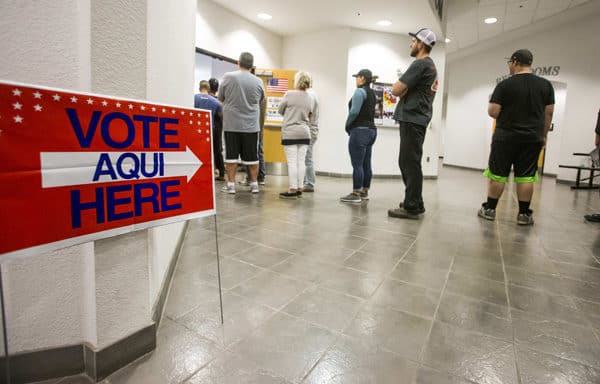Keep the Electoral College
Michael Hart, American Renaissance, September 25, 2019
It has often been suggested that it would be more fair if our president were chosen by direct popular vote, rather than by the Electoral College. On those occasions — such as in the presidential elections in 2000 and in 2016 — when the Electoral College did not choose the person who won the popular vote, the losing side felt cheated. It is plain than in such cases, the votes of some people counted more than the votes of others.
This argument against the fairness of the Electoral College seems strong. Indeed, if there were no voting fraud, I think it would be compelling. However, there is voting fraud in the United States, and it is therefore reasonable not to choose the president by direct, popular vote.
Here are some of the ways voting fraud takes place.
Registration of ineligible voters
A major way to prevent this is preregistration. Back in 1950, this was almost universal and was not controversial. However, in recent decades many claim that insisting that a voter register in advance puts an unreasonable burden on poor people, and many states now permit same-day registration. This makes it extremely difficult to check whether a registration in valid — which is the main purpose of preregistration.
Inability properly to identify voters
The best way to solve this problem is to require that a voter show a photo ID. This is standard in many democracies, including France, Italy, Belgium, Holland, Germany, Sweden, Switzerland, Italy, Hungary, Poland, Spain, Israel, Chile, Uruguay, Peru, Costa Rica, and even Mexico. However, in the United States, the Democrat Party claims that this would be an unreasonable expense for poor voters. It makes this claim even when Republicans offer to supply voter ID cards for free.
Other methods
These include vote harvesting, intimidation, or simply misreporting the results shown on a voting machine.

(Credit Image: © Marty Bicek/ZUMA Wire)
It is hard to know how much voting fraud there is nationally. Perhaps the best estimate was given by Richman, Chattha, and Earnest in 2014. According to their study, the number of non-citizens who voted in the 2008 presidential election could have been anywhere from 38,000 to 2,800,000 — a very wide range.
According to these authors:
We find that there is reason to believe non-citizen voting changed one state’s Electoral College votes in 2008, delivering North Carolina to Obama, and that non-citizen votes have also led to Democratic victories in congressional races including a critical 2008 Senate race that delivered for Democrats a 60-vote filibuster-proof majority in the Senate.
In every case, the shift was or would have been from a Republican victory to a fraudulent Democrat victory. In Congressional elections, an estimated 67 percent of fraudulent votes went to Democrats and 21 percent to Republicans. Eight-two percent of the fraudulent votes for president went to Mr. Obama.
(It’s worth noting that one of the pollsters who gathered the data on which Richman et al. base their conclusions has written a rebuttal to their interpretation of the data.)
If voting fraud happens with equal frequency in all parts of the country, it does not greatly affect who wins the national popular vote. However, voting fraud is much more common in heavily Democrat areas, and it appears that Democrat politicians are more likely to think they can profit from it; it is always Democrats who oppose proposals to make voting fraud more difficult by, for example, requiring voter ID. Voting fraud can therefore seriously affect which party wins the overall popular vote.
No system can be truly fair if there is voter fraud. However, there are ways to make it less likely that voting fraud will change the result of a presidential election.
If there is an Electoral College, and voting fraud occurs mainly in heavily Democrat states (such as California), all that happens is that the Democrat candidate gets a much larger majority in those states. Fraud will not usually affect the result in other states, and therefore will not affect the vote in the Electoral College.
The Electoral College provides a check on the effects of voting fraud and should therefore be retained.















